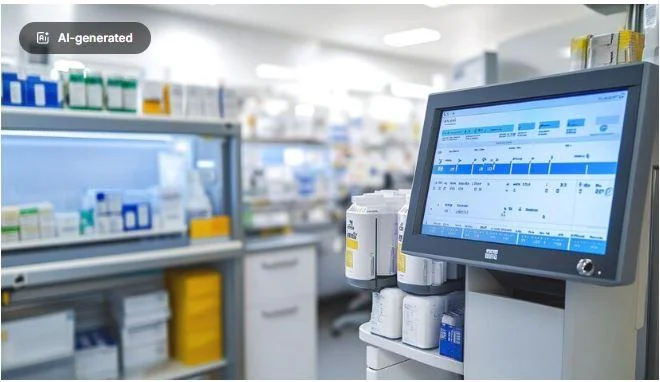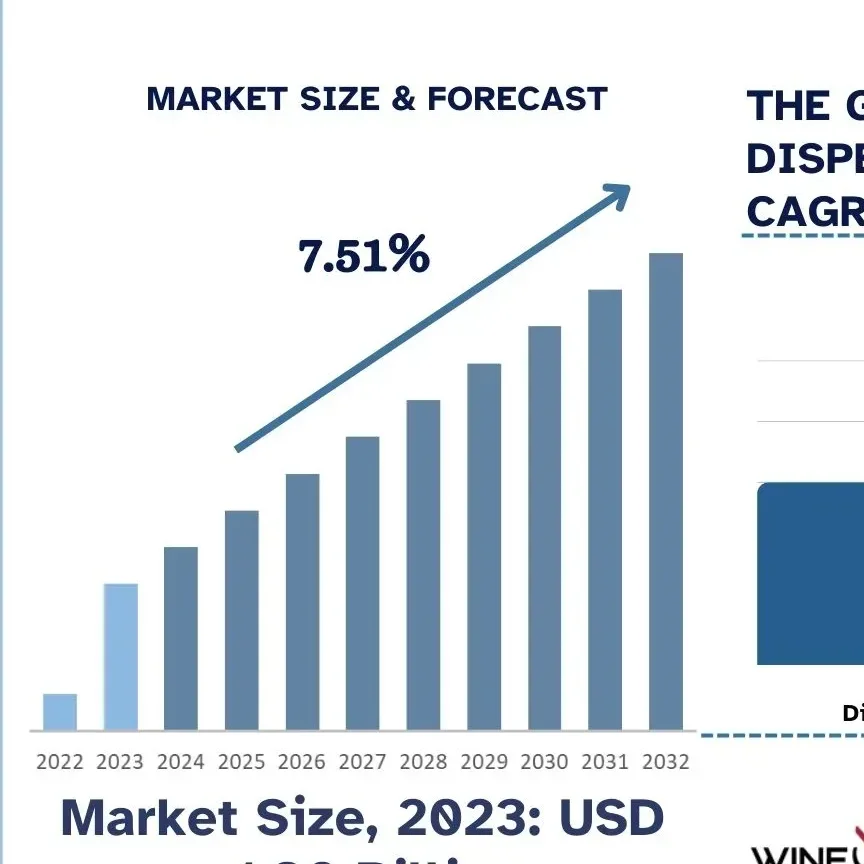According to the new market research report "Pharmacy Automation Market by Product (Automated Medication Dispensing & Storage Systems, Table-Top Counters, Retrieval Systems, Medication Compounding), End User (Inpatient, Outpatient (Fast-Track Clinics), Retail Pharmacies) - Global Forecast to 2027", published by MarketsandMarkets™, the Pharmacy Automation Market is projected to reach USD 8.2 billion by 2027 from USD 5.6 billion in 2022, at a CAGR of 7.9% during the forecast period.
Request to Download Sample Research Report
Key Insight of the Pharmacy Automation Market
North America holds the largest share of the pharmacy automation market
North America accounted for the largest share of the pharmacy automation market. Factors such as technological advancements in pharmacy automation systems, growth in the healthcare sector, and the presence of top pharmacy automation system manufacturers in the US are expected to contribute to the growth of the pharmacy automation market in North America.
The automated medication dispensing and storage system segment accounted for the largest share
Based on products, the pharmacy automation market is segmented into automated medication dispensing and storage systems, automated packaging and labeling systems, automated tabletop counters, automated medication compounding systems, and other pharmacy automation systems. the automated medication dispensing and storage systems segment accounted for the largest share of this market, primarily due to the growing need to manage increasing workloads and reduce medication errors.
The inpatient pharmacies segment accounted for the largest share of the pharmacy automation market
Based on end users, the pharmacy automation market is segmented into inpatient pharmacies, outpatient pharmacies, retail pharmacies, and pharmacy benefit management organizations and mail-order pharmacies. inpatient pharmacies accounted for the largest share of this market. This is due to the increasing use of pharmacy automation dispensing and storage systems, such as automated dispensing cabinets, across inpatient healthcare facilities. As pharmacy automation systems and solutions help ward nurses and other hospital staff dispense medication faster and more accurately than manual methods.
Global Pharmacy Automation Market Dynamics
Driver: Growing need to minimize medication errors
Medication errors and dispensing errors are recognized as leading causes of hospital readmission across the globe. Poor order communication between physicians and pharmacists, dangerous storage practices in pharmacies, and the confusion arising from similar labels and drug prescriptions during the preparation or dispensing of drugs or during drug administration are some key factors contributing to medication errors. Automated systems are considered one of the most efficient solutions to minimize these errors. In the past, the successful implementation of automated dispensing cabinets (ADCs) and automated dispensing machines (ADMs) in hospitals led to significant reductions in the number of dispensing and medication errors in hospitals.
Restraint: High initial capital investments
Despite their benefits, several healthcare professionals and providers are reluctant to adopt or accept IT-based approaches to pharmacy management. This is particularly evident when cultural barriers are involved, especially in emerging economies. Therefore, many pharmacists do not want assistance and are reluctant to adopt pharmacy automation systems as part of their dispensing regimen. Although the benefits of automated pharmacy systems are considerable and the extensive adoption of technology verifies this, until now, only large-volume pharmacies and hospitals could justify the returns on investment (ROIs) obtained from installing these automated systems.
Opportunity: Untapped emerging markets
Emerging economies are expected to become a focal point for growth in the pharmacy automation devices market. Developing countries possess a high geriatric population. According to the UN report on World Population Ageing (2019), Eastern and Southeastern Asia are expected to experience a two-fold increase in the number of geriatric individuals, with the population aged 65 years or over projected to increase from 260.6 million in 2019 to nearly 572.5 million by 2050. This demographic trend is expected to increase the patient volume in several Asian countries and drive the demand for quality patient care and efficient medication dispensing. As a result, the demand for pharmacy automation systems in several Asian countries is expected to increase in the coming years.
Challenge: Stringent regulatory procedures
The stringency of regulatory approvals depends on the class to which a particular device belongs; it may vary from one region to another. Several state boards of pharmacies (agencies of a state responsible for the control and regulation of the practice of a pharmacy and the licensing of pharmacists in the state) have different requirements for using automated dispensing devices (ADDs) in healthcare practices. Thus, manufacturers of automated systems for pharmacies have to adhere to various regulations; ensuring such compliance is a tedious task and can delay product launches.
Some of the major players operating in the pharmacy automation market are:
Becton, Dickinson and Company (US), Omnicell, Inc. (US), KUKA AG (Swisslog Healthcare) (Germany), Baxter International Inc. (US), Capsa Healthcare (US), Cerner Corporation (US), Yuyama Co., Ltd. (Japan), ARxIUM Inc. (US), Parata Systems, LLC (US), RxSafe, LLC (US), and ScriptPro LLC (US).
The study categorizes the pharmacy automation market to forecast revenue and analyze trends in each of the following submarkets:
By Product
· Automated Medication Dispensing and Storage Systems
o Automated Medication Dispensing and Storage Systems, by Type
o Robots/Robotic Automated Dispensing Systems
o Carousels
o Automated Dispensing Cabinets
· Automated Medication Dispensing and Storage Systems, By Application/Operation
o Centralized Pharmacies
o Decentralized Pharmacies
· Automated Packaging and Labelling Systems
· Automated Tabletop Counters
· Automated Medication Compounding Systems
By End User
· Inpatient Pharmacies
o Acute Care Systems
o Long Term Care Facilities
· Outpatient Pharmacies
o Outpatient/Fast-Track Clinics
o Hospital Retail Settings
· Retail Pharmacies
· Pharmacy Benefit Management Organizations and Mail-Order Pharmacies
By Region
· North America
· Europe
· Asia Pacific
· Latin America
· Middle East & Africa
Interested to Procure the Research Report? Inquire Before Buying
Content Source:
https://www.marketsandmarkets.com/PressReleases/pharmacy-automation-systems.asp
https://www.marketsandmarkets.com/ResearchInsight/pharmacy-automation-systems-market.asp
About MarketsandMarkets™:
MarketsandMarkets™ has been recognized as one of America's best management consulting firms by Forbes, as per their recent report.
MarketsandMarkets™ is a blue ocean alternative in growth consulting and program management, leveraging a man-machine offering to drive supernormal growth for progressive organizations in the B2B space. We have the widest lens on emerging technologies, making us proficient in co-creating supernormal growth for clients.
Earlier this year, we made a formal transformation into one of America's best management consulting firms as per a survey conducted by Forbes.
The B2B economy is witnessing the emergence of $25 trillion of new revenue streams that are substituting existing revenue streams in this decade alone. We work with clients on growth programs, helping them monetize this $25 trillion opportunity through our service lines - TAM Expansion, Go-to-Market (GTM) Strategy to Execution, Market Share Gain, Account Enablement, and Thought Leadership Marketing.
Built on the 'GIVE Growth' principle, we work with several Forbes Global 2000 B2B companies - helping them stay relevant in a disruptive ecosystem. Our insights and strategies are molded by our industry experts, cutting-edge AI-powered Market Intelligence Cloud, and years of research. The KnowledgeStore™ (our Market Intelligence Cloud) integrates our research, facilitates an analysis of interconnections through a set of applications, helping clients look at the entire ecosystem and understand the revenue shifts happening in their industry.






